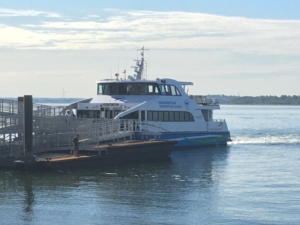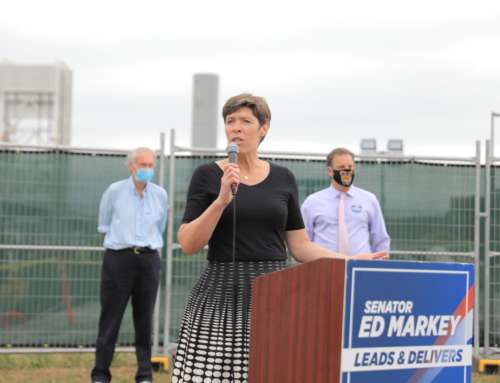(BOSTON) – When it comes to resilience in the face of the climate crisis, Representative Meschino’s (D-Hull) focus is forward, stressing the importance of public health and environmental justice as a lens for transportation policy. Internal combustion engine (ICE) vehicles cause 43% of Massachusetts’ carbon emissions and contribute to both climate change and local air pollution. Strong transportation policy supports Massachusetts economic recovery and is a means for reducing carbon emissions, mitigating harm to the environment, and protecting public health. The importance of such measures is magnified by the current public health crisis—the pandemic.
However, just as the Baker Administration has proceeded further in reopening the Massachusetts economy, the MBTA has begun outlining plans to reduce or potential eliminate service in response to low ridership during the pandemic. The stated intention is to evaluate all routes on two axes: the degree to which a population serviced by the route is transit-critical and the likelihood of high ridership on the route. A transit-critical population is one with less access to automobiles and with a larger proportion of individuals of color. Those routes servicing transit-critical populations and with the likelihood of high ridership will be given comparable or increased service compared to pre-pandemic ridership. Routes without transit-critical populations and without high ridership will be subject to cuts. While the intention to use a social justice lens should be applauded, in reality, these metrics fall short on both social and environmental justice.
The MBTA would be well advised to consider a broader policy framework of environmental justice when evaluation changes to service. One example demonstrating this is the commute into Boston from the South Shore. The major roadway into Boston is the Southeast Expressway, and it passes through environmental justice communities. The vast majority of cars on this route are ICE vehicles. With MBTA ferry and commuter rail service cuts, even more commuters will be pushed to drive to work. The increased traffic volume will lead to more congestion, carbon emissions, and pollution, all negatively impacting the communities lining the highway.
It should not be this way; in fact, the Greenbush Commuter Rail line was rebuilt as a mitigation project for the “Big Dig,” which spiked carbon emissions because reconstruction of the Southeast Expressway and Central Artery put more cars on the road. Service cuts to the Greenbush line, other commuter rail services, and ferries compromise economic recovery and ignore social and environmental justice.
“Every person on the ferry and on the commuter rail is one less car on Route 3,” said Representative Meschino, referring to the heavily trafficked highway into Boston from the South Shore. “Route 3 travels directly through environmental justice communities, as do many other high-capacity roadways. Maintaining service on the ferry, the commuter rail, and other MBTA lines gets people to work without further subjecting vulnerable communities to increased air pollution.”

The MBTA ferry at Hull’s Pemberton Point. Ferry service is a critical component of many Hull residents’ commute to the city of Boston and reduces traffic on the Southeast Expressway.
With environmental justice in mind, Representative Meschino is looking to the future of transportation in the Bay State. She joined her colleagues by voting for a $18.28 billion transportation bond bill in March 5, 2020, dedicated to maintaining and improving the Commonwealth’s roads, bridges, and public transportation systems. The legislation, An Act authorizing and accelerating transportation investment, ensures that Massachusetts invests in large-scale transportation capital and improvement projects, municipal road and bridge projects, commuter rail parking facilities, and regional transportation authorities, as well as in programs aimed at reducing congestion and improving air quality.
Representative Meschino voted for GreenWorks, a bill providing $1.3 billion in bonds for the construction of climate adaptation and mitigation measures, including repairs and upgrades to bridges and roadways, and funding for projects such as the electrification of municipal fleets. For years, she has supported local planning initiatives to assess local infrastructure and identify needs. Just this session, her 2050 Roadmap bill was passed by the House, which would regulate transportation emissions pursuant to the Global Warming Solutions Act. Investing in transportation infrastructure is one of her major priorities and protecting public transit from service cuts is one facet of that.
“Our economic vitality depends on our building transportation networks that meet our future needs,” explained Representative Meschino. “I am fighting for increased boat, rail and bus services because I know these are essential for reducing greenhouse gas (GHG) emissions and mitigating climate change. Investments in transportation should focus on de-carbonizing our networks and increasing public transit.”
Representative Meschino sees lessons in the two major forces at work today—climate change and the pandemic—to make increased investment in transportation a critical component of the Commonwealth’s healthy future. The MBTA should seek to boost transit ridership as a way to support the reopening of the Massachusetts economy, reduce GHG emissions, and decrease local air pollution along major highways. The pandemic offers time for infrastructure investments that repair, increase efficiency, and expand services of transit. These disruptions together offer the Legislature a change to reorganize around commitments to environmental justice and redesign the future of clean transportation in Massachusetts.
